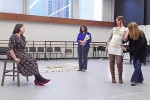Title
The last time Juilliard Opera presented Tchaikovsky’s masterpiece Eugene Onegin, in 2002, it was the full-length version with a full orchestra in the Peter Jay Sharp Theater. The Juilliard Onegin production that opens later this month, a condensed version of the opera, will focus on the intimacy of the story derived from Alexander Pushkin’s novel-length poem of the same title, and it will take place in the smaller and more intimate Rosemary and Meredith Willson Theater starting February 19. Matthew Aucoin (M.M. ’13, composition) is the conductor and Mary Birnbaum, the associate director of Juilliard’s Artist Diploma in Opera Studies program, is the director.
Body
The story focuses on Tatyana, a girl who lives on her family’s estate with her sister Olga. Their neighbor Vladimir Lensky, Olga’s childhood suitor, visits with his friend Eugene Onegin. Tatyana is taken with him and asks her governess, Filippyevna, about love. Inspired, Tatyana stays up all night writing a love letter to Onegin. He answers but doesn’t reciprocate her feelings, saying he can only be her friend. Later, at Tatyana’s name-day party, Onegin is angered by town gossips who whisper while he dances with the girl. To cause trouble, he dances with Olga, and the jealous Lensky challenges him to a duel, in which Onegin shoots and kills Lensky. Years later, Onegin returns to Russia after traveling the world, stopping first at a party hosted by his cousin Prince Gremin. To his dismay, Onegin finds that Gremin has married Tatyana. That evening, Onegin desperately confesses his love for her, but the saddened Tatyana refuses him and stays with her husband.
Brian Zeger (M.M. ’81, piano), the artistic director of the Marcus Institute for Vocal Arts, told The Journal he had been looking for a way to bring Aucoin’s talents to Vocal Arts since meeting him two years ago. “Matthew is an incredible triple threat; he’s a conductor, composer, and pianist,” all of which make him the ideal conductor for this project, Zeger said. Aucoin is youngest assistant conductor in the history of New York’s Metropolitan Opera and was recently the cover conductor for its production of Shostakovich’s The Nose.
The decision to condense the opera to an ensemble of nine singers and a 12-piece chamber orchestra was in part inspired by the opera’s premiere in 1879, which was performed by students at the Moscow Conservatory. Which makes it a good fit for Juilliard too, Aucoin, 23, told The Journal, because “the characters in Onegin are kids! Lensky is 18 and the girls might be even younger than that. Most Onegin productions (with adult singers) are the equivalent of those awkward sitcoms where the characters are in high school, but the actors are balding thirtysomethings.”
Birnbaum most recently directed Juilliard’s Le donne curiose last spring, and Zeger felt that her directing Onegin would be a natural outgrowth of both her previous Vocal Arts work and her Russian language skills. In the opera world, Onegin is often associated with romantic grandeur, elaborate scenery, and impressive choruses. Birnbaum’s direction, however, focuses on the four young lovers at the center of the story: Tatyana, Olga, Lensky, and Onegin. “The alterations I am most excited about have to do with revelations of character that I feel big productions often don’t have the time or ability to explore,” Birnbaum told The Journal, adding that this production will “intimately examine the relationships between all of the characters.” These alterations include the decision to combine the role of the governess Filippyevna with Mrs. Larin (Olga and Tatyana’s mother), and to focus on the younger generation of characters, who are the true heart of both Pushkin’s story and Tchaikovsky’s operatic adaptation. Birnbaum calls performing a piece with an ensemble of this size “opera at its purest—a group of people coming together to sing us a story.”
Zeger cited an ever-increasing interest in singing Russian repertoire as one reason to mount the opera this semester—but even more important was the fact that “we had the right roster to cast it.” The four lovers will be sung by soprano Raquel González (Tatyana), baritone Takaoki Onishi (Onegin), tenor Miles Mykkanen (Lensky), and mezzo Avery Amereau (Olga). Completing the ensemble are tenor William Goforth (Triquet), mezzo Samantha Hankey (Filippyevna), soprano Marguerite Jones (Anya), bass Önay Köse (Prince Gremin), and bass-baritone Tyler Zimmerman (Captain Zaretsky). Juilliard’s Russian coach, Gina Levinson, prepared both language and music with the students, which for most was their first endeavor into a full-length Russian opera. Also integral in musical preparation were Reed Woodhouse and Adam Nielsen, while Natalia Katyukova coached both music and language.
Performing Onegin in the Willson Theater should further illuminate the intimate and humanistic aspects of this great story. Aucoin said it was “in the piece’s spirit” to “take the most intimate scenes (which are the heart of the piece) and present them in an intimate space.” And Birnbaum went one step further: “I hope the audience will be so absorbed with the story and characters that they won’t have time to think about themes or ideas,” she said.





